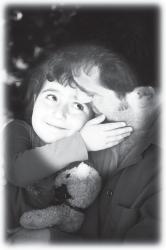When Mommy or Daddy has Special Needs

Published in baystateparent Magazine
“We may be blinded by our own perceived flaws, but those who
love us have clearer vision.”
– Sarah Ban Breathnach
What makes a person a good parent? Is it staying up-todate on the latest parenting
advice from the experts? Spending more time with your kids? Volunteering at school?
baystateparent recently interviewed two Massachusetts parents to better understand their unique perspectives on parenting. Here are their stories:
Laura Fritz is an intelligent, compassionate adoptive mom of 2-year-old Mayleah (pronounced “Myla”) McKenny. Mayleah was born 16 weeks premature, weighing just 1 lb 6 oz, her birth mother a drug addict. At 13 months, Mayleah was placed into foster care with Laura and her husband Jared.
“We got a phone call about a foster-to-adopt situation for a special needs baby,” recalls Laura. With a background in special needs and two degrees – Bachelors in Intensive Special Education and Masters in Early Childhood Education, Laura was an obvious choice for a baby like Mayleah.
Yet Laura’s biggest concern is that other people – including her newlyadopted child – will think she’s dumb.
“I’m afraid that someday she’ll learn the word ‘stupid.’ And she’ll associate it with Mommy,” Laura says.
Laura has dyslexia, a lifelong learning disability that challenges her in spelling, handwriting, organization, time management, concentration and focusing on complex tasks.
When she was a child, Laura recalls how some teachers called her “dumb” and “stupid.” Ironically, it was these labels that Laura credits with inspiring her to “always want to do better,” she says.
Because her disability is not immediately obvious, Laura says, people can make wrong assumptions about her competency, including being a good mom.
Everyday parenting tasks normally taken for granted are monumental challenges for Laura. “Writing notes to school or filling out a form is huge,” she says. “They can’t read my writing.”
Getting Mayleah ready for preschool — dressing her, braiding her hair and fixing a lunch is daunting.
“It can take me six hours to make a lunch,” she says.
Laura admits that she tends to overcompensate to hide her disability from others.
“I work harder to make lunch look nice, because I don’t want people to realize that I have this disability,” she says.
Laura prefers that others don’t know about her dyslexia, and relies mainly on her husband and father for support.
“I don’t want people to know that I’m dyslexic,” she says. “When people find out, they offer sympathy. I’m not looking for sympathy. I’m just looking for an equal playing field.”
Laura is uniquely aware of the challenges that her daughter will face, as Mayleah receives help for her own developmental difficulties.
“She has physical therapy to help her with walking. She has some hearing issues. She gets occupational therapy to help her with fine motor skills. She had musical therapy. She has early intervention,” Laura says. Yet Laura also describes Mayleah as “just your normal 2-year-old,” dressing up dolls and saying every toddler’s favorite word, “no.”
Becoming a parent, especially of a special needs child, says Laura, has increased her motivation to overcome her own disability.
“It makes me want to be better. It makes me want to change and work on my issues more,” she says.
Being a mom with disabilities is challenging for Laura. But it has also been life changing.
“In my child’s eyes, she sees me as I wish I could see myself,” says Laura. “In her eyes I am perfect. She does not care that I cannot spell, or that sometimes it takes me longer to do things. She just knows love. I love her and she loves me. And in the end that’s what matters.”
With a Masters Degree in Counseling Psychology and over twenty years of professional counseling covering drug addiction, child abuse, troubled teens and families in crisis, and most currently, adults with learning disabilities, Mark Paharik has seen it all.
“But that doesn’t mean I know it all,” he emphasizes. “Even though I have a Master’s degree, some days as a dad, I’m scratching my head. Kids save all their best stuff for their parents,” he quips.
Head-scratching is one thing Mark can do easily without assistance. Spastic Cerebral Palsy at birth left Mark with both legs and his left arm severely impaired. Mark walks slowly with crutches, with knees bent and body hunched over. He drives a car with special hand controls, and uses a motorized scooter for longer excursions. He works hard to keep pace with his two young children, Daniel (7) and Carlie (4).
Mark is married to Emily, also a counselor, who practices part-time.
“We met at Bally’s Total Fitness in the pool. She had a water aerobics class next to my lane, so as she was crossing my lane I stopped, pulled up my goggles, and said, ‘Hello my name is Mark, would you like to share my lane?’ That was my pick-up line. Real smooth, huh?”
They married twelve years ago, bought a modest house in Worcester and eventually decided to start a family.
“When you haven’t yet been a parent, you don’t understand the full implications and gravity of what you’re doing,” Mark says. “We knew I wasn’t going to be able to pick up and carry the children. We knew I wasn’t going to be doing any heavy lifting, but until you go through it, you don’t know all the ways you are going to be challenged.”
Mark credits his wife with unselfish dedication and carrying “much more than half” the load of parenting.
“We don’t exist in traditional roles. Emily does all the yard work, heavy lifting, shopping, laundry, and has assumed the primary daily responsibility for the care of our children. She encourages me, challenges me, worries about me and prays for me in my role as a parent.”
Two nights a week, Mark assumes full responsibility for parenting while Emily is at work. Keeping up with his two young children takes “an incredible amount of energy,” he says.
His children have had questions and concerns about their dad’s disability.
“When Daniel was 5, he thought that he would get cerebral palsy too. It was an identification issue. He thought, ‘I’m a guy, Daddy’s a guy. Am I going to have a problem with my legs?’” Mark recalls.
“Daniel has also worried about what others might say about him or me because I am his father. He has wished I could walk and be able to do physical activities with him,” Mark says.
Despite these concerns, “My children accept me and tell me frequently that they love me,” says Mark.
Mark says that being a dad has taught him, “what it’s really like to truly love children and be responsible for their growth as human beings.”
“As parents, we all have our own disabilities, but how we choose to live despite our disabilities makes a significant lasting impression on our children in their lives,” he says.
Support for Parents
with Disabilities
Over the past few decades, individuals with physical and cognitive disabilities have increasingly become more mainstreamed in their communities. Many of these individuals form significant relationships and become parents. The key to successful parenting for these individuals is to have the longterm, relevant support systems in place, says Susan Jones, Coordinator of The Positive Parenting Resource Center of The United Arc of Franklin and Hampshire Counties in Massachusetts.
“All of us, whether we are labeled as having a disability or not, do better when we have a support system, — friends, families, neighbors, that we can rely on,” says Leslie Kinney, Associate Director.
The Positive Parenting Resource Center provides a variety of specialized services for parents with intellectual or learning disabilities, including in-home education, support groups, mentoring, parenting workshops, advocacy and housing. Last year, the center serviced 101 families in Western Massachusetts.
Still, parents with disabilities are often subject to assumptions regarding their ability to be a good parent.
“The major two misconceptions people have is that if somebody has an intellectual disability, they can’t parent,” says Leslie. “And the other is that they can’t learn. Everybody is a lifelong learner. Research supports that parents with disabilities can learn new skills.”
Both Laura and Mark hope their personal disabilities are an inspiration rather than a hindrance to their children’s emotional growth.
“When Mayleah gets a bit older and asks questions, I’m going to tell her is that everyone’s different. There’s no right. Everyone is different and that’s OK,” says Laura.
Mark has already seen his son Daniel reach out to kids who are difficult or maybe not as popular.
“He’s more likely to befriend a kid who has challenges, although those challenges may not be as obvious as someone who’s on crutches,” he says. “I’m extremely proud of that.”
For more information on the Positive Parenting Resource Center, The United Arc of Franklin and Hampshire Counties, visit unitedarc.org.
 My professional experience includes leading the creative efforts of three companies I have co-owned. I'm a seasoned copywriter/creative director, award-winning journalist, avid runner, and mom of four. Got a story idea you'd like to share? Email me at treske@nowspeed.com. You can also find me on Twitter: @trishreske, LinkedIn and Facebook.
My professional experience includes leading the creative efforts of three companies I have co-owned. I'm a seasoned copywriter/creative director, award-winning journalist, avid runner, and mom of four. Got a story idea you'd like to share? Email me at treske@nowspeed.com. You can also find me on Twitter: @trishreske, LinkedIn and Facebook.